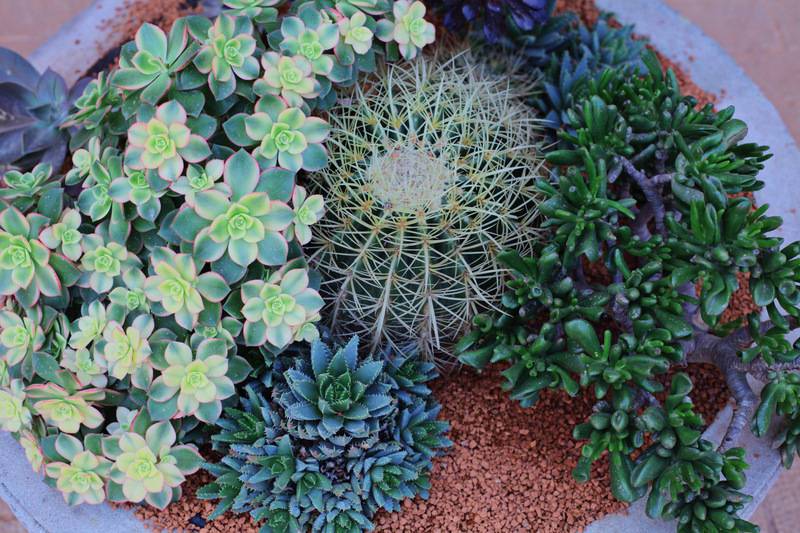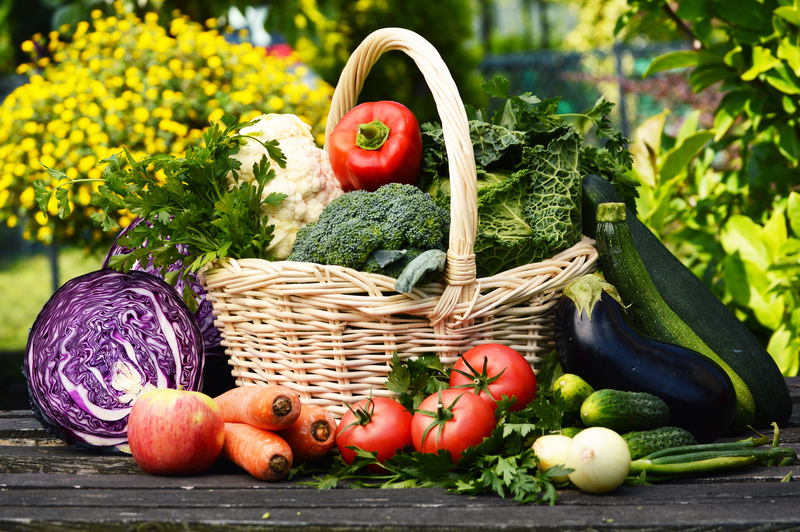Organic Waste Alchemy: Transformative Soil Enrichment Techniques
Posted on 16/06/2025
Organic Waste Alchemy: Transformative Soil Enrichment Techniques
Organic waste has long been considered a problem in urban and rural environments alike. But what if, instead of viewing waste as a challenge, we recognize its potential as a goldmine for soil transformation? This concept lies at the heart of Organic Waste Alchemy--the art and science of converting organic refuse into life-giving soil amendments through a range of transformative enrichment techniques. This comprehensive article explores modern and traditional approaches to organic waste management, turning everyday kitchen scraps, garden cuttings, and agricultural residues into valuable resources that revitalize our earth.
Understanding Organic Waste Alchemy
The term Organic Waste Alchemy refers to the process of transforming various forms of biodegradable material--food scraps, yard clippings, animal manure, and more--into powerful soil enhancers. It merges principles of ecology, chemistry, and agriculture to enrich soil health with minimal environmental impact. If you're keen to unlock the power hidden in organic waste, this guide covers the most effective, eco-friendly soil enrichment techniques that can revitalize your garden, farm, or community green space.
The Value of Organic Waste Transformation
- Reduces landfill waste: Diverting organics from landfills cuts methane emissions and lowers the carbon footprint.
- Improves soil fertility: Organic amendments restore vital nutrients and improve microbial diversity.
- Enhances water retention: Rich organic matter increases soil's ability to hold moisture, reducing irrigation needs.
- Promotes plant resilience: Healthier soils boost plant immunity, productivity, and disease resistance.
- Closes the nutrient loop: Using local waste resources makes your growing system more sustainable and cost-effective.

Key Techniques for Organic Waste Transformation
Several methods exist to break down organic matter into plant-available nutrients. Let's explore the most popular and effective organic waste alchemy techniques that foster transformative soil enrichment:
1. Traditional Composting
Composting is the cornerstone of organic waste reuse. By piling organic waste in a managed heap or bin, natural decomposition processes break down material into dark, crumbly humus. The resulting compost adds nutrients, improves soil structure, and hosts beneficial microorganisms.
Steps to Successful Composting:
- Gather materials: Combine green (nitrogen-rich) and brown (carbon-rich) wastes.
- Balance ratios: Aim for a carbon-to-nitrogen (C:N) ratio of about 30:1 for optimal decomposition.
- Maintain moisture: Compost should feel like a wrung-out sponge--moist but not soggy.
- Aerate regularly: Turn the heap every 2-3 weeks to keep microbes active and odors down.
- Monitor temperature: Composting generates heat; turning helps keep all materials decomposing evenly.
Tip: Avoid adding meat, dairy, or oily foods to home compost bins, as they can attract pests and slow decomposition.
2. Vermicomposting (Worm Composting)
For those with limited space, vermicomposting offers an efficient way to convert kitchen scraps into rich, nutrient-dense worm castings (vermicast). Red wigglers (Eisenia fetida) are commonly used for this process, feeding on organic matter and producing fine, odorless compost ideal for pots, beds, and gardens.
How to Start a Vermicompost Bin:
- Set up a well-drained container
- Add moist bedding--shredded newspaper, cardboard, or coconut coir
- Introduce worms and feed small amounts of kitchen scraps (avoid citrus, onion, and spicy foods)
- Monitor moisture and keep the bin in a cool, shaded location
- Harvest castings every 2-3 months for use as a powerful soil amendment
3. Bokashi Fermentation
Bokashi offers a rapid, low-odor way to ferment all food waste--including meat and dairy--using anaerobic fermentation. This technique relies on Effective Microorganism (EM) solutions to inoculate organic matter, packing it in airtight containers. After 2-4 weeks, the "finished" bokashi can be safely dug into garden beds or added to compost for final breakdown.
- Reduces odors and pests compared to traditional composting
- Retains more nutrients in finished product
- Accelerates composting process when added to soil or regular compost heap
4. Mulching and Sheet Composting
Nature is the ultimate alchemist, layering leaves, wood, and debris atop bare earth. Mulching mimics this process: organic wastes such as grass clippings, shredded leaves, straw, or wood chips are spread on the soil surface, suppressing weeds, protecting against erosion, and gradually breaking down to feed the soil.
Benefits of Sheet Mulching:
- Suppresses weeds without synthetic herbicides
- Improves water retention and soil insulation
- Feeds beneficial soil organisms as material decomposes
- Boosts soil organic matter year after year
Sheet composting (also called "lasagna gardening") involves layered beds of waste and cover materials right on top of existing soil, turbocharging decomposition and enriching the earth below.
5. Biochar Production
Biochar is a highly porous, carbon-rich material created by burning biomass (wood, crop wastes, etc.) in a low-oxygen environment (a process called pyrolysis). When added to soil, biochar improves nutrient retention, water holding, and microbial habitat--all beneficial for soil health. It's also a long-term carbon sink, helping fight climate change.
- Produces a stable form of carbon that resists decomposition
- Increases cation exchange capacity, making nutrients more available to plants
- Attracts and sustains beneficial microbes
- Enhances resilience against drought and soil degradation
6. Anaerobic Digestion and Compost Teas
Anaerobic digestion converts organic wastes into biogas for energy and digestate for soil enrichment. On a smaller scale, garden compost teas--aerated water steeped with finished compost--build up populations of beneficial microbes that boost plant health.
- Reduces greenhouse gases by capturing methane for fuel
- Yields a nutrient-rich liquid fertilizer for foliar feeding
- Puts brewing wastes and manure to productive use
Choosing the Best Technique for Your Needs
The right organic waste transformation method depends on your space, waste type, climate, and goals. Here's a quick guide:
- Urban gardeners: Vermicomposting or Bokashi for small indoor spaces and varied kitchen waste.
- Backyard growers: Traditional composting, sheet mulching, and mulching for larger volumes.
- Farmers: Biochar and anaerobic digestion scale up the transformation and maximize nutrient returns.
- Community projects: Centralized composting or anaerobic digestion facilities manage larger, mixed waste streams.
Maximizing Soil Enrichment: Advanced Strategies
Layering Approaches for Optimal Results
True Organic Waste Alchemy lies in combining these techniques for synergistic gains. For example:
- Initiate a sheet mulch using municipal leaf waste as the carbon base, follow with kitchen scraps, and top with composted manure.
- Add biochar to compost piles to capture nutrients and prime the carbon for microbial colonization.
- Inoculate finished compost with compost tea to multiply the beneficial microbe population before adding to garden beds.
Optimizing Inputs: What (and What Not) to Use
Best Materials for Transformative Soil Enrichment:- Vegetable and fruit peels
- Coffee grounds and filters
- Tea bags (unbleached), leaves, and grass clippings
- Shredded newspaper, cardboard, and straw
- Animal manures (herbivore only), sawdust, and wood chips (untreated)
- Crop residues and non-invasive garden waste
- Meat, bones, dairy (except in Bokashi)
- Grease, oils, and synthetic chemicals
- Diseased plants or invasive weed seeds
- Glossy papers, large branches, or treated wood
Balancing Nutrition: The Science of Soil Enrichment
Effective organic waste transformation rewires the nutrient cycle, returning essentials like nitrogen, phosphorus, potassium, calcium, and trace elements to the soil. But it's not all about raw nutrients! A balanced approach supports:
- Soil structure: Organic materials bind particles together, improving airflow and water penetration.
- Soil life: Diverse bacteria, fungi, and invertebrates thrive on organic inputs, building a living web beneath your feet.
- Nutrient cycling: Slow, steady mineralization from organic matter minimizes nutrient loss and pollution.
Pro tip: Test your soil periodically to ensure pH and major nutrient levels remain in the optimal range for crops or ornamentals.
Enhancing Microbial Populations: The Secret of Alchemy
The real magic of organic waste transformation occurs at the microscopic level. Beneficial microbes break down complex organics, release plant-available nutrients, and outcompete soil pathogens. Some advanced gardeners inoculate their compost with mycorrhizal fungi, beneficial bacteria, or EM products to supercharge decomposition and nutrient transfer.
Environmental and Social Impact of Organic Waste Alchemy
- Climate action: By recycling organics locally, you help reduce greenhouse gases and landfill emissions.
- Food security: Improved soil health leads to more abundant, resilient crops with fewer chemical inputs.
- Resource savings: Transforming waste into soil amendments reduces reliance on synthetic fertilizers and mining.
- Community empowerment: Neighborhood and institutional composting builds networks, educates, and inspires stewardship.
Case Studies: Organic Waste Alchemy in Action
- Urban gardens: Community composting in Brooklyn, NY diverts tons of food scraps monthly and produces compost for food justice programs.
- Schools: Classroom worm bins teach children science and sustainability, while providing vermicast for edible gardens.
- Regenerative agriculture: Farms in India and Africa use biochar and composting to boost yields, restore degraded land, and lock away carbon.

Troubleshooting and Best Practices
Common Pitfalls and How to Avoid Them
- Odors: Result from too much moisture or too many nitrogen-rich materials. Solution: Add more dry, carbon-rich matter and turn the pile.
- Pests: Attracted by meats or improper covering of food scraps. Solution: Use tight-fitting lids, avoid forbidden foods, and always cover kitchen waste with browns.
- Slow decomposition: Caused by imbalance in C:N, dryness, or cold weather. Solution: Adjust ratios, add water, or insulate piles in winter.
Tips for Scaling Up
- Start small: Master one technique at home before expanding to larger systems.
- Engage your community: Group efforts can handle more waste, share tools, and spread knowledge.
- Track your impact: Weigh your organic waste and finished compost to appreciate your contribution to sustainability.
The Future of Transformative Soil Enrichment
As urban populations rise and soils degrade worldwide, organic waste alchemy will play a pivotal role in sustainable food systems, climate adaptation, and environmental stewardship. Emerging trends--such as smart composting bins, biochar from novel feedstocks, and advanced microbiological inoculants--promise to make organic waste transformation even more efficient and accessible.
Final Thoughts
Whether you're a backyard gardener, small farmer, or sustainability advocate, transformative soil enrichment using organic waste offers benefits beyond cleaner waste streams. It builds a vital link between your daily choices and the living earth, turning yesterday's scraps into tomorrow's abundance. As we embrace Organic Waste Alchemy, we not only enrich our soils--we heal our planet.
- Ready to begin your journey with organic waste transformation?
- Start with a compost bin, experiment with mulching, or join a local composting club.
- Observe, learn, and adjust your methods for the best soil enrichment outcomes.
Unlock the secrets of organic waste alchemy--and watch your soil, plants, and ecosystem thrive!
Latest Posts
The Eco-Benefits of Climate-Conscious Gardening
Finding the Beginning of Your Garden Restoration
3 Simple and Effective Tips for Managing Garden Weeds
Curate the Perfect Garden Vibes with Thoughtful Seating
Embark on Your Gardening Adventure: 9 Tips for the Uninitiated



